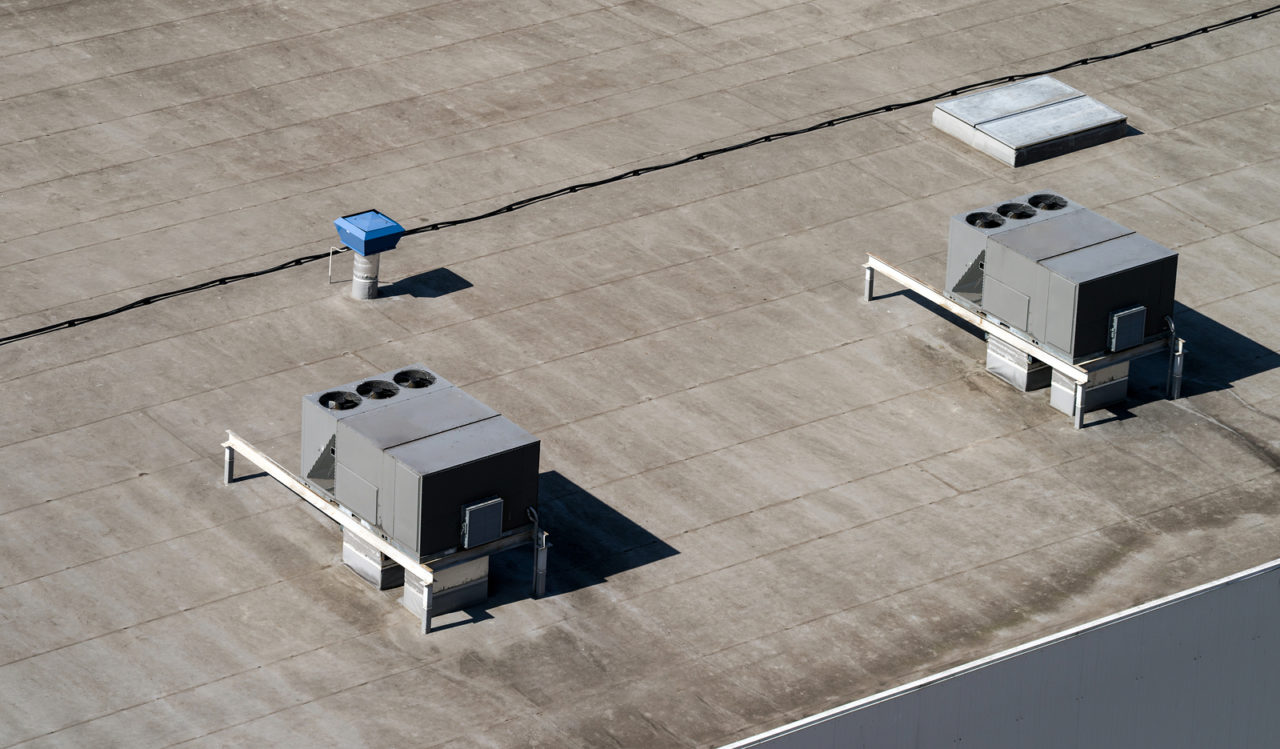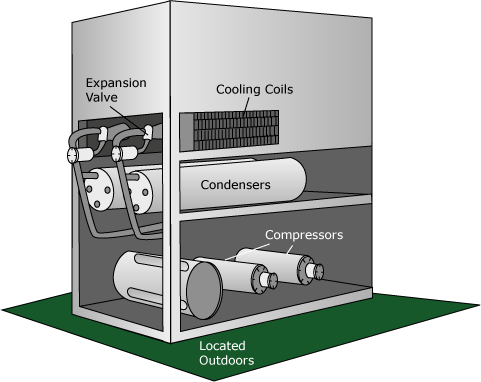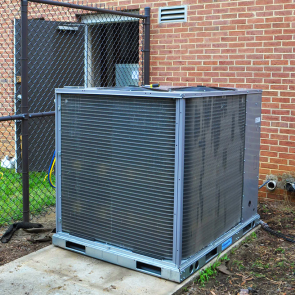
Outdoor packaged united, rooftop units, packaged rooftop units; whatever you want to call them, this piece of equipment is used far and wide in HVAC systems for mid-sized commercial buildings such as offices, schools, churches, and retail. But, how exactly do they help keep spaces comfortable? Well, if you’ve ever wondered that, we’ve got some answers for you.
First, let’s take a quick look into your basic package unit:

Air comes into the unit from the building, sometimes combined with air from outdoors. Air moves through filters and evaporator coils to where coolant is used to remove heat and moisture. The blower motor then pushes this newly conditioned air back into the space. The used coolant is recycled back through the condenser coils or compressor so it can be used again. Voila!
Once you’ve got a basic understanding of how a package unit delivered conditioned air to a building, next we can talk about the different variables that separate one package unit from another.
Type
The way the air is treated, whether by electricity or gas, or another mechanism, is based on the type of package unit. Some of the differences betweens types of outdoor and rooftop package units are:
3-Phase Heat Pump: This type of package unit works well for larger capacity systems that need a three phase power supply. As opposed to a single phase unit, these will alternate power generation, transmission and distribution in order to handle large motors and other heavy loads.
Cooling Only: No heat. Simple as that.
Electric Heat: These package units use electricity to produce heat.
Gas Heat: These units use gas to produce heat.
Hybrid (Dual Fuel) Heat: As the name implies, hybrid heat combines the strengths of a gas furnace with an electric heat pump in order to strike a balance between efficiency and lowering your utility bills.
Hydronic Heat: This type of unit uses heated water (either by gas, electricity, or a combo) to warm the air in a space.
The Electric vs. Gas Debate
Both electric and gas have their pros and cons. Gas heat is less expensive, and tends to heat more quickly. However, the equipment can be more expensive and have a shorter lifespan. On the flip-side, electric heat can be more expensive to run and slower to heat a space. It does however have a lower up-front investment, and is generally easier to maintain.
The right unit for your building is based on a lot of factors. Get in touch with us today to find out more.
Energy Efficiency Ratio (EER)
These days, energy efficiency is on our minds. More than ever, facilities managers are willing to spend more up front in order to gain ongoing energy efficiency. This Energy Efficiency Ratio (EER) tells you how much power it takes to run your system. Specifically, it’s the the ratio of the cooling capacity of the unit (in Btu per hour) to the power input (in Watts). For commercial package units, there are various efficiency ratings.
There are other ways to calculate energy efficiency, such as Integrated Energy Efficiency Ratio (IEER) and Seasonal Energy Efficiency Ratio (SEER) that account for different loads and outdoor temperatures.
So what’s right for your building? The truth is, it depends. The best option is to have an experience firm lay out all of the options so that you can make the best decision.
Capacity (Tons)
Here’s a fact that may help you at your next trivia night: one refrigeration ton is equal to the rate of heat required, 12,000 BTU per hour to be exact, to melt one ton of ice in a 24-hour period. For commercial package units, getting capacity right is a big deal. Too little, and you can’t keep your space comfortable. On top of that, your system will always be working overtime. Too much, and you’ll be wasting (and paying for!) capacity you don’t need.
Another thing to consider is how you can divide up capacity among several units. By creating some redundancy [Link to HVAC Redundancy infographic], you can avoid a total system failure in case one unit has issues.

One of the best ways to make sure your space is comfortable is to be familiar with your HVAC equipment. Now, the next time you see a package unit on the roof or on the side of the building you’ll know exactly how it works. What you may not know is… how reliable is my HVAC system? That’s where we come in. Many of our clients reach out because they don’t know exactly how old their system is, how well it was maintained, and if there’s a chance for a critical issue to crop up. The good news is, many new clients qualify for a no-cost site inspection. Just give us a call at 703.891.4600 to find out, or fill out the form below!

